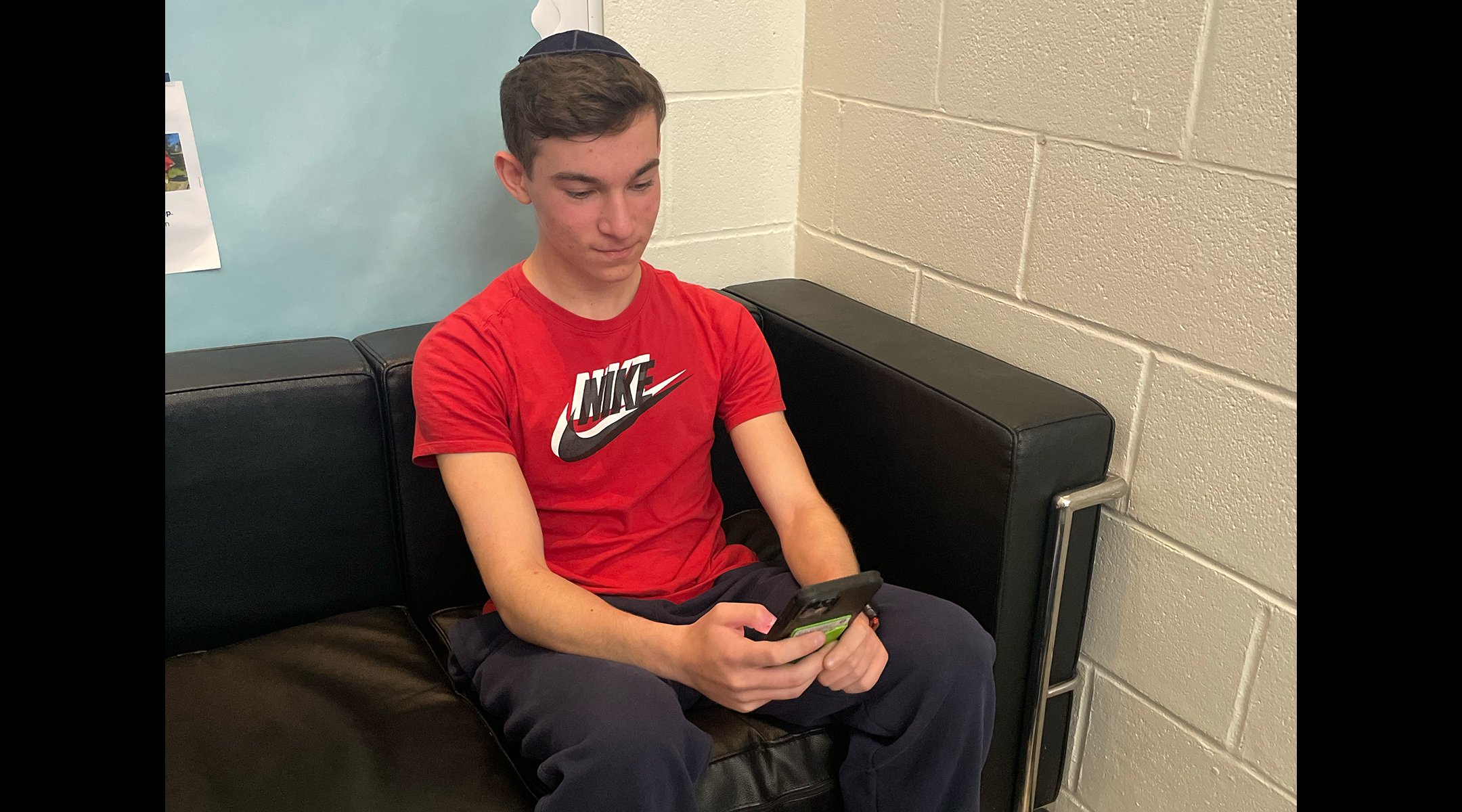This article was produced as part of JTA’s Teen Journalism Fellowship, a program that works with Jewish teens around the world to report on issues that affect their lives.
Every time Gabrielle Levine opens her Instagram page she is met with a barrage of images and videos, often emotionally disturbing, featuring news updates from the war in Israel. Instead of continuing the mindless scrolling, Levine takes a moment to repost and share content regarding hostages held in captivity, war updates or news about Israeli soldiers that she said “resonates” with her.
Levine, a 17-year-old from Brooklyn, has been a proud Zionist as long as she can remember, but since the war began in October 2023, she’s turned her online scrolling into an advocacy mission to share news and information about Israel.
It wasn’t always this way. When the war began, the information overload was too much. Each post and comment stressed her out and heightened her anxiety. “I didn’t know if I would open the app and see puppies and food, or claims that Israel was committing genocide,” she said. “In the end, the stressors took a tool on my overall health. It became internalized and my body felt like it was under attack.”
For the first few months after Oct. 7, she had no access to social media because she deleted Instagram from her phone. When she reinstalled the app, Levine committed to setting time limits for herself to avoid getting overwhelmed.
Today, Levine uses her “voice on social media to speak out against antisemitic and anti-Zionist hate,” she said. “My voice is not going to create peace in the Middle East, but if it resonates with one more person and allows them to see what we see, then it’s a win in my book.”
For many Jewish teens, a change in social media habits after the war provided an opportunity to re-evaluate their relationship to the media — and those shifts are still shaping how teens engage online today. Barraged with posts about the war — many deeply anti-Israel and even antisemitic, others Islamophobic, with both sides sharing misinformation — teens deleted apps or avoided the news altogether. Others threw themselves into advocating for Israel.
Months later, those choices continue to influence their use of digital social networks.
Since Oct. 7, “Jewish teens become much more deliberate about how they use social media,” said Aaron Bregman, the director of high school affairs at the American Jewish Committee. ”Some have stepped up their advocacy, using platforms to push back against misinformation and share their personal experience.”
This past February, when Hamas announced the deaths in captivity of the Bibas family — a mother and two young boys who had become symbols of the Israeli hostages’ plight — teen Israel advocate Misha Shteingart, who uses they/them pronouns, left Instagram. They were overwhelmed by the news and overload of posts and pictures that flooded the app.
“I’m back from a self-mandated break off Instagram,” Shteingart, a Jewish 16-year-old from Westchester, New York, who has over 3,200 followers, wrote when they returned a few days later. “I honestly don’t have the words to express the feelings of the last few days…and that’s okay…remember to take care of yourselves first. Am Yisrael Chai.”
Jordan Bitton, a 16-year-old from Long Island, said that he advocates for Israel and for the Jewish people through his Instagram account. Bitton said that the online presence of Israel news serves “as a constant reminder that we are going through this together and we will come out strong and victorious.”
In the early months of the war, Bitton often posted statistics and updates on the development of the war, but today his focus is on issues that pull him emotionally, like the release of the hostages or the deaths of Bibas family members.
“I definitely feel a lot more connected after 500-plus days. You kind of form a connection to the hostages,” Bitton said.
The teens JTA spoke to shared that they are open to learning from other activists and from perspectives that differ from their own.
“I think that you can really develop an informed opinion when you speak to people from all sides, my goal is never to really win an argument but to have respectful conversations,” Glassman said. “A healthy conversation comes from a positive place and it’s important to speak to those who respect your opinion.”
When it comes to the relationship between social media and mental health, experts feel that it is important for teens to be aware of their behaviors online.
“Checking in with themselves and monitoring what is going on on the inside, their regulation and nervous system, is a really healthy habit,” said Jerusalem-based family counselor and educator Aviva Goldstein.
“Something that can be really healthy for teens on social media,” she said, “is for them to just check in with themselves and ask themselves the questions: ‘Am I spending the amount or time on social media that feels right to me? Should I be spending more or less time online? How do these posts make me feel?’”
For Sofie Glassman, a 17-year-old from Long Island, the answers to those questions led her to spend more time online. Since the war began, she spends nearly three hours a day on Instagram, a two-hour increase from before Oct. 7. Glassman used her online accounts to advocate for Israel as soon as the war started, and she continues to repost content related to the hostages or antisemitism at least once daily, and often multiple times throughout each day.
The teen said she makes an effort to avoid misinformation. When accounts have biases or post false information, Glassman knows “the importance of fact checking and reading into what you’re seeing and making sure that it’s accurate.” For example, Glassman believes that information from the pro-Israel activists and influencers Noa Tishby or Hen Mazzig is reliable, whereas she feels that news from the Qatari-based news service Al Jazeera — which Israel banned, calling it a threat to security and a partner of Hamas — is biased and not factually accurate. (Al Jazeera has repeatedly rejected such accusations.)
AJC’s Bregman credits teens who make the effort toward media literacy. “Social media platforms are flooded with misleading content, and teens often struggle to differentiate between credible news, opinion pieces and outright propaganda,” he said.
That struggle is worth it for Glassman. “Now, more than ever, it’s so important for the Jewish people to use their voice, share what [we] think, and really just spread awareness about what’s going on,” she said.
JTA has documented Jewish history in real-time for over a century. Keep our journalism strong by joining us in supporting independent, award-winning reporting.





